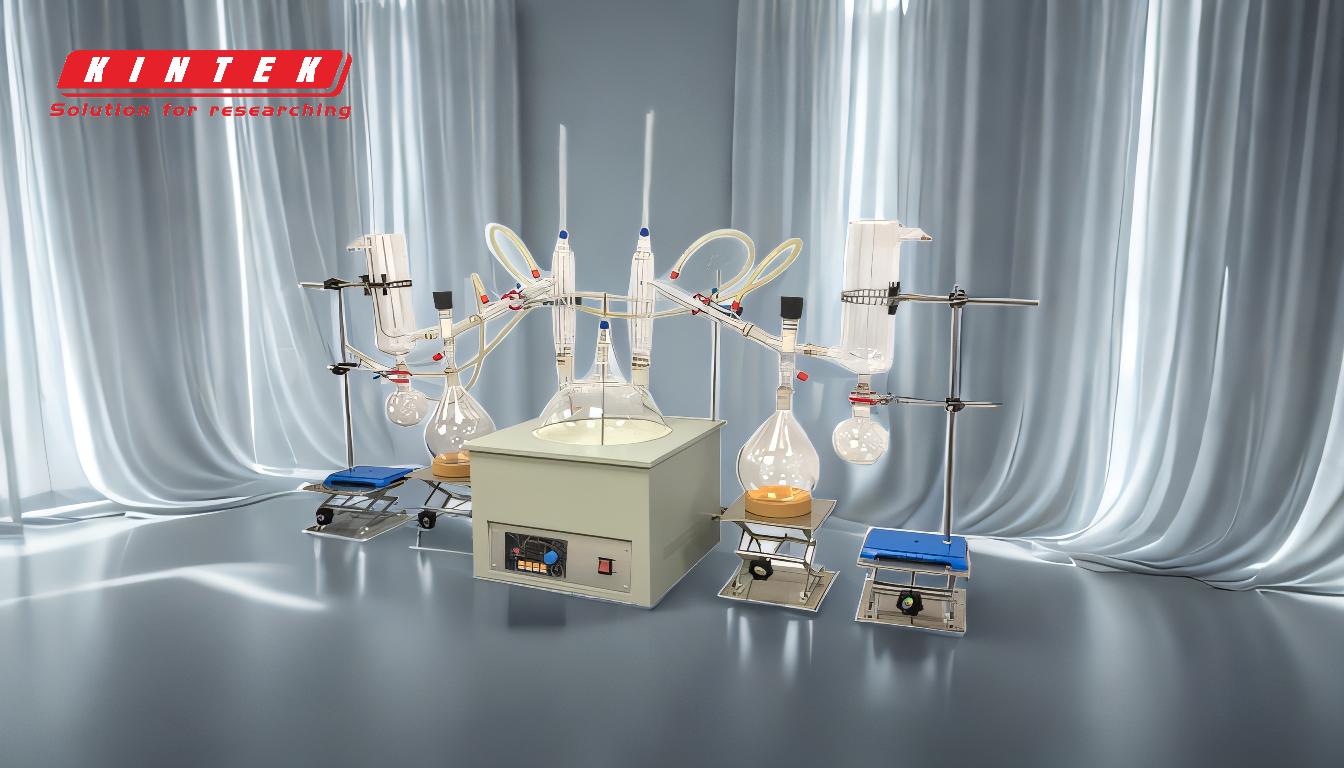Distillation is a critical separation process used in various industries, including chemistry, pharmaceuticals, and cannabis extraction. The success of distillation depends on several key factors, such as temperature control, vacuum levels, feed rate, equipment setup, and monitoring. Properly managing these factors ensures efficient separation, high product purity, and avoidance of thermal degradation. For example, maintaining a steady vacuum level lowers boiling points, reducing the risk of damaging heat-sensitive compounds like cannabinoids. Additionally, careful setup, such as securing connections and insulating components, ensures safety and process stability. Monitoring the reaction and adjusting parameters like stirring speed and temperature in real-time is also essential for achieving optimal results.
Key Points Explained:

-
Temperature Control
- Temperature is one of the most critical factors in distillation. It must be carefully controlled to ensure the desired components vaporize without degrading heat-sensitive materials.
- For example, in CBD and THC oil distillation, closely controlled temperatures are necessary to preserve cannabinoid integrity.
- In fractional distillation, where components have boiling points within 25°C of each other, precise temperature regulation ensures proper separation.
- Using a vacuum can lower boiling points, allowing distillation at lower temperatures, which is especially useful for thermally sensitive compounds.
-
Vacuum Level
- Maintaining a steady vacuum level is crucial for consistent separation efficiency and product quality.
- A vacuum reduces the boiling points of materials, enabling distillation at lower temperatures and minimizing the risk of thermal degradation.
- For example, in cannabinoid distillation, a controlled vacuum ensures that cannabinoids are not exposed to excessive heat, preserving their potency and purity.
-
Feed Rate
- A steady feed rate ensures a consistent flow of material into the distillation system, which is essential for maintaining separation efficiency.
- Fluctuations in feed rate can lead to uneven distillation, resulting in impurities or incomplete separation.
- In processes like fractional distillation, a controlled feed rate helps achieve the desired purity of the distillate.
-
Equipment Setup and Safety
- Proper setup of distillation equipment is critical for safety and process stability.
- Ensure all connections are secure and components are in working order before starting the process.
- Insulation, such as wrapping the boiling flask and part of the distillation head, helps maintain consistent temperatures and prevents heat loss.
- For example, leaving the Vigreux column visible allows for real-time observation of the reaction.
-
Stirring Speed
- Stirring ensures uniform heating and prevents localized overheating, which can degrade sensitive compounds.
- Adjusting stirring speed during the process is often necessary. For instance, increasing the RPM to 900-1000+ as the fluid level decreases helps maintain efficiency.
- Proper stirring also prevents bumping, a phenomenon where sudden boiling can cause splashing or uneven distillation.
-
Monitoring and Adjustments
- Continuous monitoring of the distillation process is essential for identifying and addressing issues in real-time.
- For example, if little to no reaction occurs, slightly increasing the temperature or adjusting the vacuum level can initiate the process.
- Once the reaction stops and distillate flow ceases, it is important to stop the heat, stir, and vacuum pump, then open the system to atmospheric pressure.
-
Material Input Volume
- The volume of material being distilled must be carefully controlled to ensure optimal separation and avoid overloading the system.
- Overloading can lead to inefficient distillation, while underloading may result in unnecessary energy consumption.
- In cannabinoid distillation, precise control of material input volume is necessary to achieve high purity and avoid damaging the cannabinoids.
-
Thermal Degradation Mitigation
- Thermal degradation is a significant risk in distillation, especially for heat-sensitive compounds like cannabinoids.
- Lowering the boiling point through vacuum distillation and maintaining controlled temperatures helps mitigate this risk.
- Monitoring the process and adjusting parameters as needed ensures that materials are not exposed to excessive heat.
By carefully managing these factors, distillation processes can achieve high efficiency, product purity, and safety, making it a reliable method for separating and purifying complex mixtures.
Summary Table:
| Factor | Importance |
|---|---|
| Temperature Control | Ensures vaporization without degrading heat-sensitive materials. |
| Vacuum Level | Reduces boiling points, minimizing thermal degradation. |
| Feed Rate | Maintains consistent material flow for efficient separation. |
| Equipment Setup | Ensures safety, stability, and consistent temperature control. |
| Stirring Speed | Prevents localized overheating and ensures uniform heating. |
| Monitoring & Adjustments | Allows real-time adjustments for optimal results. |
| Material Input Volume | Avoids overloading or underloading the system. |
| Thermal Degradation | Mitigates risks for heat-sensitive compounds like cannabinoids. |
Optimize your distillation process today—contact our experts for guidance!










